- Home
- Iain Banks
The Bridge
The Bridge Read online
The Bridge
Iain Banks
A man lies in a coma after a near-fatal accident. His body broken, his memory vanished, he finds himself in the surreal world of the bridge - a world free of the usual constraints of time and space, a world where dream and fantasy, past and future fuse. Who is this man? Where is he? Is he more dead than alive? Or has he never been so alive before?
'Iain Banks of THE WASP FACTORY eclipses that sensational debut...a real dazzler' Daily Mail
'Great artistry, great virtuosity ... great exuberance' New Statesman
'This one's his best yet' New Musical Express
'THE BRIDGE is serious, but playful; it is full of throwaway jokes, minor tangles for the reader to sort out, political/cultural references to the kind of reality that rarely gets into British literature, and nuggets of surprising truth juxtaposed with outrageous lies... convincing in a way too little fantasy or mainstream literature is' City Limits
The Bridge
Iain Banks
Notes:
The horizontal lines represent sections of the book that were separated with a large amount of whitespace.
Coma
Trapped. Crushed. Weight coming from all directions, entangled in the wreckage (you have to become one with the machine). Please no fire, no fire. Shit. This hurts. Bloody bridge; own fault (yes, bloody bridge, right colour; see the bridge, see the man drive the car, see the man not see the other car, see the big CRASH, see the bone-broken man bleed; blood colour of the bridge. Oh well own fault. Idiot). Please no fire. Blood red. Red blood. See the man bleed, see the car leak; radiator red, blood red, blood like red oil. Pump still working - shit, I said shit this hurts - pump still working but the fluid leaking out all over the fucking place. Probably get hit from behind now and serve me right, but at least no fire, yet anyway; how long, I wonder how long since? Cars; police cars (jam sandwiches) jam sandwich; me am di jam in di sandwich car am di sandwich. See the man bleed. Own fault. Pray nobody else hurt (no don't pray, atheist, remember that, always swore [mother: 'no need to use that sort of language'] always swore you'd be the atheist in the fox hole well your time has come lad because you're leaking away onto the grey-pink road and a fire might start and you might be dying anyway, and you might get hit up the backside by another car if anybody else is staring stupefied at that damn bridge so if you're going to start praying now would seem like quite a reasonable time but ahshit and whatthehell - CHRISTTHISHURTS! [OK; used only as swear-word, nothing serious, honest; swear to God.] OK: see you God, yer a basturt, so ye are.) That's telling them all, kid. What were those letters? MG; VS; and me, 233 FS. But what about - ? Where - ? Who - ? Oh shit, I've forgotten my name. This happened once at a party; drunk and stoned and stood up too quick, but this time it's different (and how come I remember forgetting that time and can't remember my name now? This sounds serious. I don't like this. Get me out of this.)
I see a chasm in the rain forest, bridge of creepers, and a river far below; a big white cat (me?) comes leaping along the trail, pounding onto the bridge; white it is (is this me?), an albino jaguar, racing across the swaying bridge (what am I seeing? Where is this? Is this what really happened?) long flinging strides, white death (should be black but I've got a negative attitude, ha ha) tearing across the bridge -
It's stopped. The scene whitens, holes appear in it; a film burning through (fire!), trapped in the gate (jaguar in the gate?); stopped, the scene melts, the seen scene disintegrates (see the seen scene disintegrate); nothing stands too close enquiry. White screen left.
Pain. Circle of pain on chest. Like a brand, a circular impression (am I a figure on a stamp, postmarked? A piece of parchment embossed with 'From the library of .........'. (Please complete:
(a) God, Esq
(b) Nature (Mrs)
(c) C. Darwin & Sons
(d) K. Marx pic
(e) all of the above.))
Pain. White noise, white pain. First weight from all directions, now pain. Ah life's never-ending variety. I am moved. Mobile man; am I cut free? Or has a fire started? Am I just dying, bleached out, drained away? (Returned, overdue?) I see nothing now (I see everything now). I lie on a flat plain, surrounded by tall mountains (or maybe on a bed, surrounded by ... machines? People? Either; both (Like, man, in the really wide view, they're the same. Far out.) Who cares? Do I care? Shit, maybe I'm already dead, maybe there's life after life ... hmm. Maybe all the rest was a dream (yeah, sure), and I wake up to ('Thedarkstation') - what was that?
Did you hear that? Did I hear that?
The dark station. There it was again. A noise like a train whistle; something about to depart. Something about to begin, or end, or both. Something that is THEDARKSTATION me.
Or not (me no know. Me new here. No ask me.)
The dark station.
Oh, all right ...
Metaphormosis:
One
The dark station, shuttered and empty, echoed to the distant, fading whistle of the departing train. In the grey evening light the whistle sounded damp and cold, as though the cloud of exhausted steam producing it had imparted some of its own character to the noise. The mountains, covered in their close, dark weave of trees, absorbed the sound like heavy cloth soaking up drizzle; only the faintest of echoes came back, reflected from where crags and cliffs and slopes of jumbled scree and fallen boulders broke the conformity of forest.
When the noise of the whistle had died away, I stood for a while, facing the deserted station, reluctant to turn to the silent carriage behind me. I listened, trying to catch some last hint of the engine's own busy noise as it steamed down the steep valley; I wanted to hear its panting breath, the busy clatter of its pistoned hearts, the chatter of its valves and slides. But though no other sound disturbed the valley's still air, I could hear nothing of the train or its engine; they were gone. Above, the steeply pitched roofs and thick chimneys of the station stood out against the overcast sky, black on grey. Some wisps of steam or smoke, only slowly dissipating in the valley's moist, chill air, hung above the black slates and soot-darkened bricks. An odour of burned coal and the damp, used smell of steam seemed to cling to my clothes.
I turned to look at the carriage. It was sealed, locked from the outside and fastened with thick leather straps. It was black-painted, funereal. In the traces two nervous mares stamped at the leaf-strewn road leading from the station. They shook their dark heads and rolled their huge eyes. Their harnesses clinked and jingled, rocking the carriage behind them slightly, and from their flared nostrils issued clouds of steam; equine impressions of the departed train.
I inspected the carriage's shuttered windows and locked doors, testing the tight leather strapping and pulling on the metal handles, then I climbed to the driver's seat and took up the reins. I stared at the narrow track leading into the forest. I reached for the whip, hesitated, then put it back, unwilling to disturb the valley's atmosphere of silence. I took hold of the wooden brake lever. In some strange inversion of physiology, my hands were moist while my mouth was dry. The carriage shook, perhaps due to the restless movements of the horses.
The sky above was dull and grey and uniform. The higher peaks around me were obscured somewhere above the tree line by the smooth mat of cloud; their jagged summits and sharp ridges seemingly levelled by the soft, clinging vapour. The light was at once shadowless and pervasively dim. I took out my watch and realised that even if all went well I was unlikely to finish my journey in daylight. I patted the pocket containing my flint and tinder; I could make my own light when that around me failed. The carriage rocked again, and the horses stamped and stirred, craning their necks round, eye-whites bulging.
I could delay no further. I released the brake and urged the pair into a trot. The carriage lurched and creaked, rumb
ling heavily over the rutted road, away from the dark station and into the darker forest.
The road climbed through the trees, past small clearings and over hollow-bellied wooden bridges. In the darkness and the silence of the forest, the torrents beneath the bridges were rushing oases of pale, white light and chaotic noise.
The air grew steadily colder as we climbed. The mares' breath wreathed back around me, thick with the smell of their sweat. The perspiration on my own brow and hands was chill. I reached into my coat for my gloves, and my hand brushed against the thick grip of the revolver in my jacket. I fastened my gloves, drew my coat closer about me, and as I tightened the belt of the garment, was impelled to look again at the bindings and fastenings securing the carriage behind me. In the gloom, however, it was impossible to tell whether the straps still held or not.
The way steepened between the thinning trees; the mares laboured up the rutted track, into the lower reaches of the dark grey overcast, wisps of barely seen cloud mingling with and absorbing thier ghostly white breath. The valley beneath was a formless black pit; not a single light, no fire or movement, and no sound that I could detect issued from its depths. A groan seemed to come from the carriage as we rolled into the enveloping clouds; it lurched as a wheel struck and rolled over a rock in the track. I patted the pistol concealed within my jacket, determining that the groan I had heard was simply that of the carriage's wooden couplings flexing against each other. The cloud grew thicker. The small, stunted trees just visible at the sides of the rough track looked like the dwarfish, deformed sentinels of some phantom fortress.
I stopped in the mist on a level length of the track. The carriage lamps produced, when the flames had steadied, two cones of light which did little to illuminate thp ground far beyond the sweat-slicked, tossing heads of the mares, but the lamps' hiss was somehow purposeful and comforting. In their glare, I again checked the carriage bindings. Some had loosened, doubtless due to the road's many corrugations and stony obstacles. I turned the lamps in their sockets, pointing them forward again once my inspection was completed. Their diffused beams encountered the damp vapour like contrary shadows, obscuring more than they revealed.
The carriage rose through the clouds and out of them, following the increasingly broken surface of the track as it gradually levelled out and straightened, heading through a narrow defile in the rocks where the mists slowly thinned. The lamps on either side of me seemed to hiss more quietly, and their beams became sharper. We approached the saddle of the pass and the small plateau beyond.
The last tendrils of the mist stroked past the gleaming flanks of the horses and the strapped sides of the carriage like nebulous fingers reluctant to let us go. Above, the stars shone.
Grey peaks rose into blackness on either side, jagged and alien. The confined plateau was steel grey under the bright stars; dark shadows spread from the rocks on either side of us where the beams of the lamps struck them. The clouds behind formed a hazy ocean, lapping at the sharp islands of distant peaks rising from it. I looked back to see those summits on the far side of the valley we had left, and when I turned to the fore again immediately saw the lights of the oncoming carriage.
My initial start disturbed the mares, causing them to shy and swerve. I checked them immediately and urged them forward again, calming my foolish heart as best I could and reproving myself for such nervousness. The distant carriage, twin-lamped like my own, was still some way off, at the far end of the flattened crucible which formed the summit of the pass.
I settled the revolver further into my inner pocket and flicked the reins, sending the gasping mares into a slow trot which even on that level surface they struggled to maintain. The opposing set of lights, flickering yellow stars come down to earth, wavered, their approach quickening.
Near the centre of the plateau, in the midst of the boulder-field, our carriages slowed. The road through the pass was broad enough for only a single vehicle, the larger rocks and stones having been cleared to each side to provide a way through the broken terrain. A small passing place, an oval area where a width of road greater than a single carriage had been swept from the surrounding rubble, lay equidistant between my own carriage and that approaching. I was now able to discern the two white horses pulling the vehicle and, despite the glare of the flickering lamps, make out an indistinct figure seated on the driver's box. I reined the mares in, letting them amble slowly forward so that our two carriages would meet at the passing place. My counterpart appeared to anticipate me, and also slowed.
It was at that instant that a strange, unnamable fear gripped me; a sudden and uncontrollable spasm of shivering ran through me, as if an electric charge had struck my body, some lightning bolt, invisible and silent, leaping from that clear, still sky. Our carriages reached the opposite ends of the small passing area. I swerved to the right; the carriage facing me went to its left, so that our teams faced one another, each blocking the other's way. They stopped, even before I and the other driver reined them in. I pulled back, clicking with my tongue, persuading the animals to reverse. The other carriage also retreated. I waved at the shadowy figure on the other vehicle, trying to indicate I would go to the left this time, allowing him to pass on my right. He waved simultaneously. Our carriages stopped. I was unable to determine whether the gesture by the other driver was meant to show he agreed to proceed or not. I pulled the two panting mares to my left. Again the other carriage moved as though to block me, but so immediately that it appeared we had moved simultaneously once more.
Defeated again, I stopped the two mares; they faced their ghostly opposites across a clear space of air which was filled by their joined breaths. I decided that rather than retreat on this occasion I would hold my own carriage steady and wait for the other driver to do so, thus enabling me to pass.
The other carriage remained, quite stationary. An increasing unease caused my whole frame to stiffen. I felt impelled to stand up, shading my eyes from the glare of the sputtering lamps and attempting to see the driver facing me across this short but frustratingly impassable distance between us. I saw the other man rise to his feet as well, for all the world as though he was my own reflection; I would have sworn that he too raised one hand to his eyes, just as I had done.
I remained still. My heart beat quickly within my chest, and the strange clamminess I had experienced on my hands before returned, even within my hide gloves. I cleared my throat and hailed the man on the opposite carriage. 'Sir! If you please, go-'
I halted. The other driver had spoken - and stopped speaking - just at the moment I had started, and then stopped. His voice was not an echo, he did not speak the words I spoke, and I was not even sure that he had spoken the same language, but the tone had been similar to my own. A nervous fury gripped me; I waved violently to the right, he gesticulated at the same moment to his left. 'Right!' I shouted as he too called out.
I remained standing for a moment, unable to pretend to myself that the tremor which ran through me then was any sort of reaction to the physical temperature; I trembled, I did not shiver, and as much to take the weight from my now unsteady legs as to proceed with my just decided course, I sat down quickly. Without looking directly at my opponent - for so I now thought of this person apparently determined to prevent my progress - I took up the whip and cracked it over the mares, guiding them left. I heard no other whip crack, but the pair of white horses facing me reared like my own pair, then swerved to their right, so that the four beasts rushed momentarily towards each other, before they reared once more, forelegs rising, harnesses jangling, heads and flailing legs almost touching. Crying out, standing again, cracking the whip over them, I pulled them back, attempted to pass the other carriage on its opposite side. Again I was thwarted, the carriage facing me seeming to mirror my every action.
I drew the nervous, head-tossing mares back at last, facing the equally disturbed pair on the other side of the rock-cleared oval space. My hands were shaking and a cold sweat had broken on my brow. I squinted ahead, de
sperate to see just who my strange adversary was, but above the glare of the carriage lamps there was only the faintest outline of a figure, and the face was quite invisible.
There was no mirror I was certain (even this absurd possibility at that moment seemed more acceptable than anything else), and besides, the horses facing me were white, not dark like the pair attached to my carriage. I wondered what to do next. I could see no alternative route through the pass; the boulders and rocks which had been cleared to form the track had been piled-up forming a makeshift wall half the height of a man on either side of the way. Even if I was able to find a gap, the ground beyond would be so rough and broken as to remain impassable.
I put the whip away, climbed down to the stony ground. The other driver did the same. I hesitated when I saw this, the sensation of unattributable but intense unease striking me again. Almost involuntarily, I turned and looked behind me, past the sealed carriage, down the road from the lip of the plateau. To return, to retrace my steps, was unthinkable. Even had my purpose been mundane, had I been some ordinary traveller merely intent on reaching a remote inn or distant town on the other side of the pass, I would have been reluctant in the extreme to turn back; I had seen no other tracks or roads deviating from the path I had taken from the station far below in the valley, and I had heard of no other pass through these mountains within a day's ride. Given the nature of my cargo and the urgency of my mission, I had no choice but to continue on the way I had chosen. Under the pretence of pulling my collar tighter about me, I pressed the bulk of my concealed revolver against my chest. Stealing myself, trying to reach within my being to draw on whatever reserves of rationality and courage I could find, it all but escaped my notice that the figure standing in the glare of the opposing lights seemed to mimic my movements, also pulling on his lapels or collar, before stepping forward.

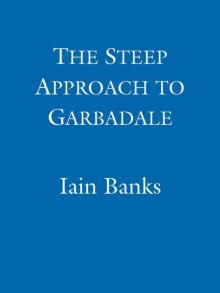 The Steep Approach to Garbadale
The Steep Approach to Garbadale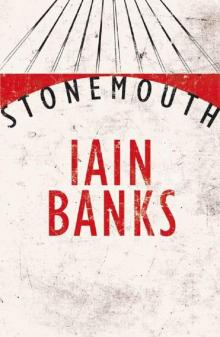 Stonemouth
Stonemouth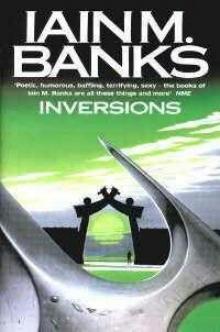 Inversions c-6
Inversions c-6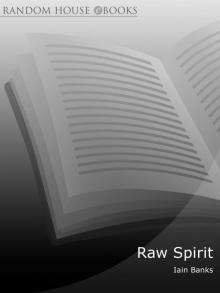 Raw Spirit: In Search of the Perfect Dram
Raw Spirit: In Search of the Perfect Dram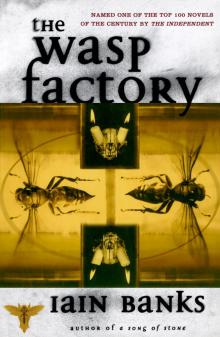 The Wasp Factory
The Wasp Factory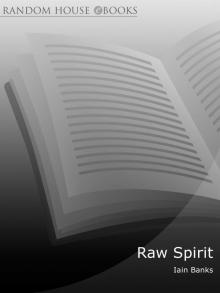 Raw Spirit
Raw Spirit Walking on Glass
Walking on Glass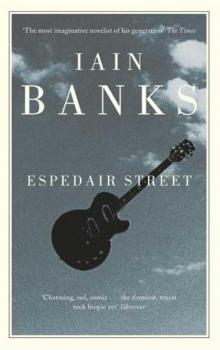 Espedair Street
Espedair Street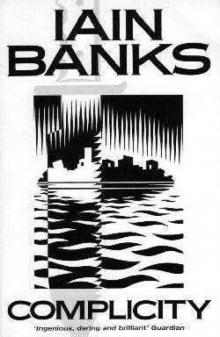 Complicity
Complicity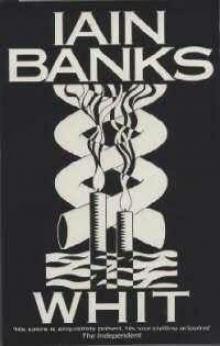 Whit
Whit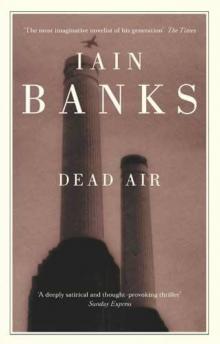 Dead Air
Dead Air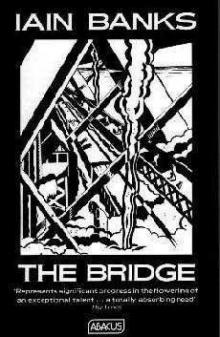 The Bridge
The Bridge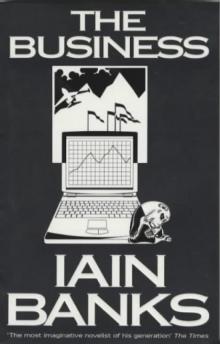 The Business
The Business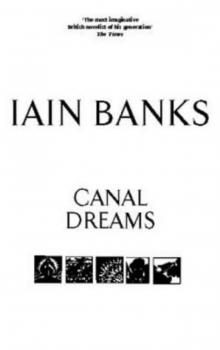 Canal Dreams
Canal Dreams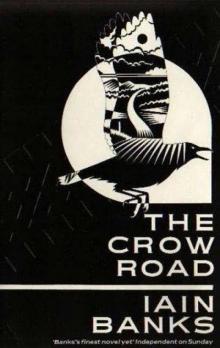 The Crow Road
The Crow Road